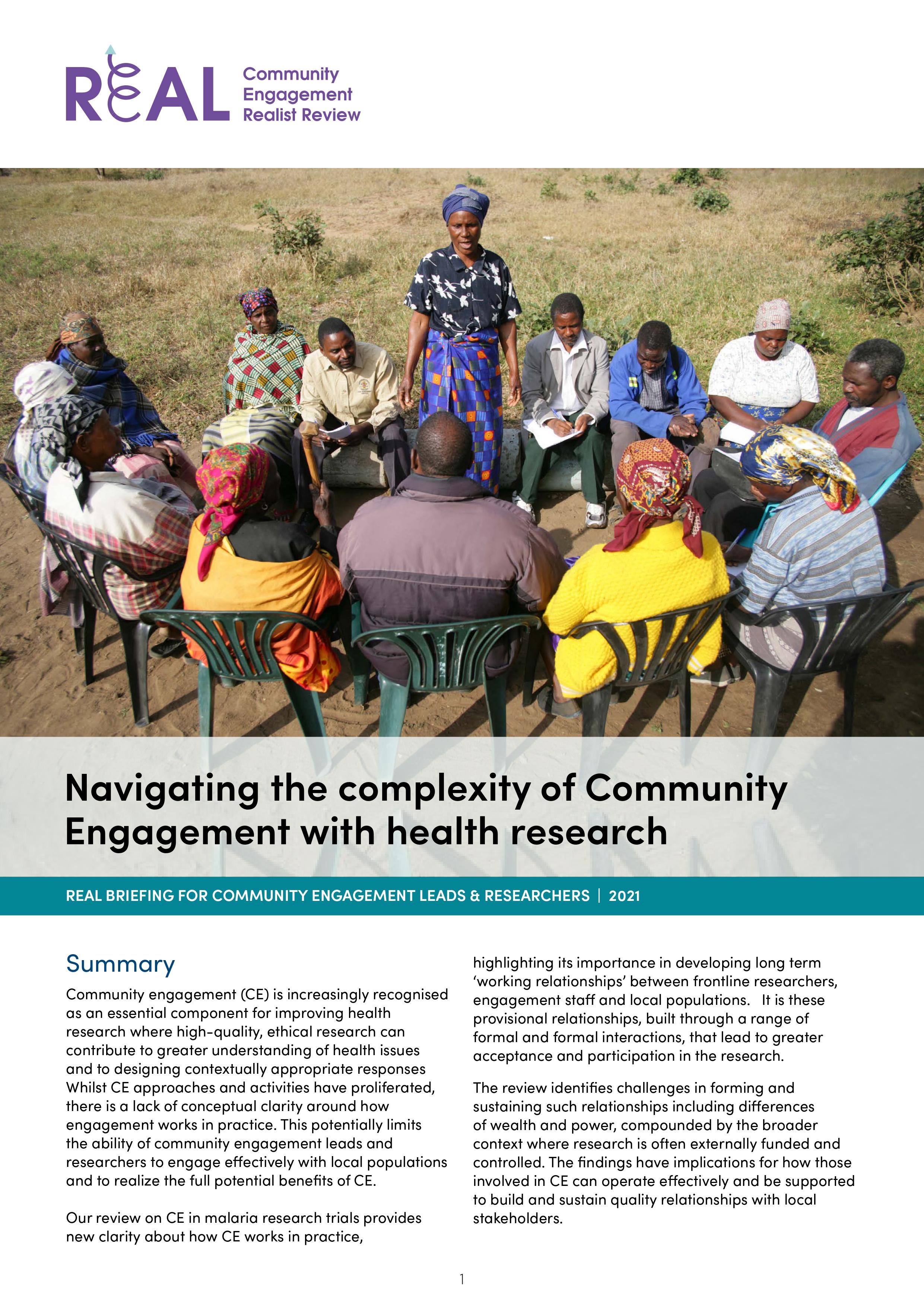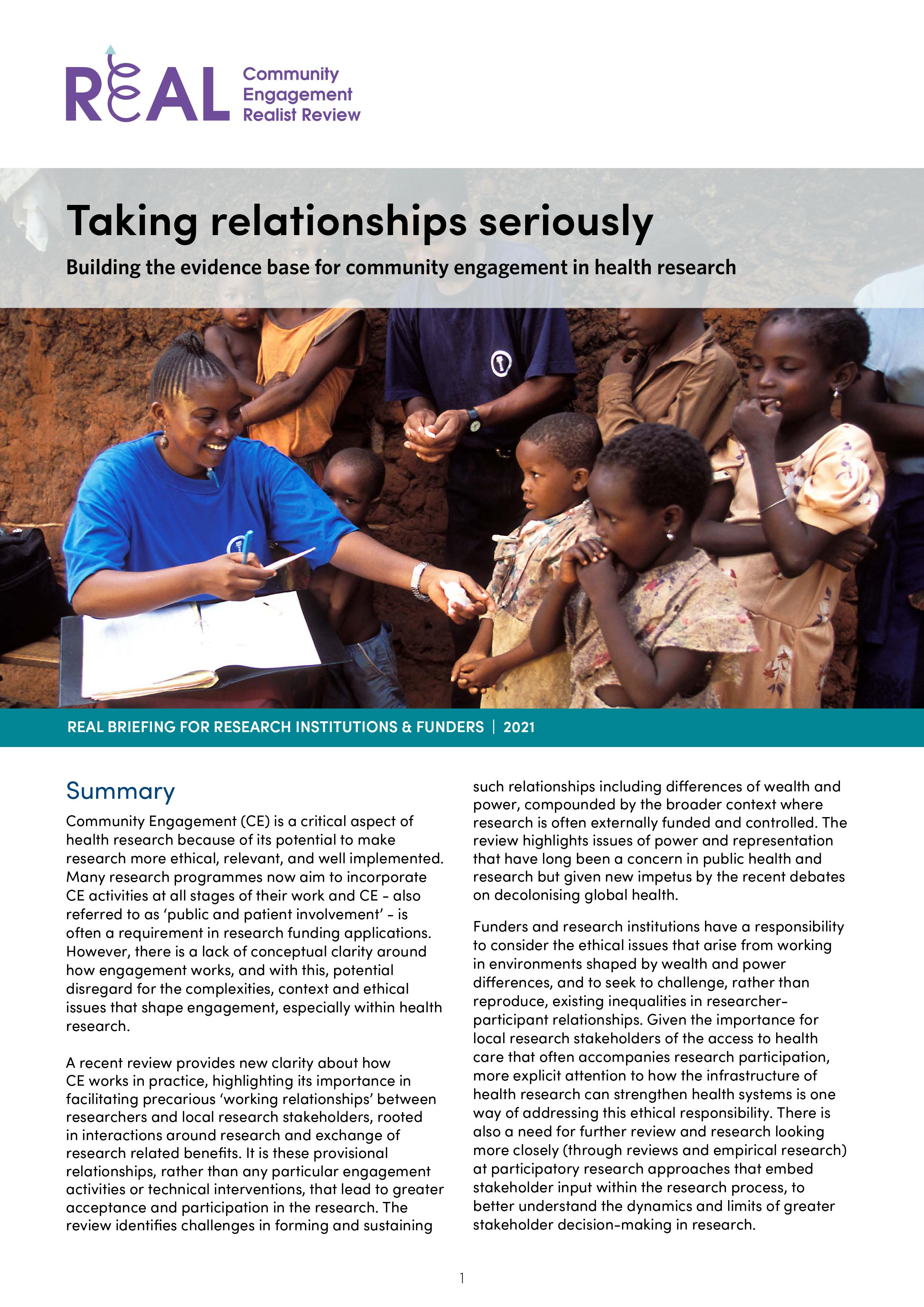
Community engagement (CE) is increasingly recognised as an essential component for improving health research where high-quality, ethical research can contribute to greater understanding of health issues and to designing contextually appropriate responses. Whilst CE approaches and activities have proliferated, there is a lack of conceptual clarity around how engagement works in practice.
The REAL Community Engagement Realist Review in global health research aimed to bring greater clarity and consistency to the field through review of the evidence around community and public engagement. The project intitally looked at published papers and engagement work within malaria research trials in low- and middle-income countries (LMICs). REAL is supported by the Wellcome Trust, UK, KEMRI-Wellcome Trust Research Programme, Kenya and Emory University, USA (2019-20). Read more background on the aims of REAL
Findings of the Review
The findings from REAL community engagement realist review suggest CE involves facilitating precarious ‘working relationships' between researchers and local stakeholders, rooted in interactions around research that are experienced as relatively responsive and respectful, and the exchange of tangible research related benefits.
The review identifies challenges in forming and sustaining such relationships including differences of wealth and power, compounded by the broader context in which health research is often externally funded and controlled.
It also highlights how the very relationships that help to get research done may risk accommodating and reproducing some of the ethically problematic characteristics of the current research paradigm in global health research.
While the review focused on Malaria research trials in LMICs, it helps to illuminate some of the key relational dynamics at stake in CE more generally, and highlights the need to build on these insights to consider engagement in a broader range of settings, including in more participatory research paradigms.
Published Paper on REAL: Vincent R, Adhikari B, Duddy C et al. ‘Working relationships’ across difference - a realist review of community engagement with malaria research [version 1; peer review: 1 approved]. Wellcome Open Res 2022, 7:13 (https://doi.org/10.12688/wellcomeopenres.17192.1)
Editorial: Community engagement and the centrality of ‘working relationships’ in health research. Vincent R, et al
Recommendations from the review include:
- The potential to build on the infrastructure of health research and community engagement relationships to strengthen health systems in LMICs
- Flexible funding and planning to allow CE to better inform research
- Institutional support for local engagement staff who play complex intermediary roles
- Greater clarity on expected engagement outcomes and the ’terms of engagement’
- Extension of the review from ‘common current practice’ in biomedical research trials to learn from participatory research paradigms
The REAL team have produced briefings based on their findings aimed at different groups within global health research. Download them below:
Briefing for Research Institutions & Funders [PDF 926K) Briefing for Community Engagement Leads & Researchers [PDF 1.25MB)
Background on the Project
Why was it needed?
Community Engagement (CE) is increasingly recognised as a critical aspect of global health. Recent years have seen an expansion of CE activities linked to health research, but clarity about the aims of engagement, consistency around the distinctions between types of engagement - and the mechanisms underpinning them - has yet to be established. Deeper investment in CE by funders, implementers and health research programmes is hampered by the lack of a coherent evidence base for the impact and value of CE.
Part of the challenge is that community engagement is a complex, multi-stakeholder process that varies widely according to the goals of the research, and the contexts of application. Realist review is a recognised way of helping to understand how and why the same intervention may perform differently when the context and implementation vary. Realist review can organise evidence on complex interventions to draw out transferable learning and identify ‘what works for whom in what circumstances’.
What did it aim to do?
REAL aimed to address this critical knowledge gap by conducting a comprehensive realist review of CE in the context of global health research. it aimed to help in understanding the characteristics and impacts of engagement between research institutions, researchers, communities and stakeholders affected by health research.
Review questions included; what are the intended outcomes of CE strategies? what mechanisms underpin intended and unintended outcomes of CE? and what important aspects of context have an influence?
Given the scope and heterogeneity of the CE literature, Malaria was used as a ‘pathfinder’ topic. Malaria is both a high priority for partners and an area where there is extensive engagement experience. The review will be extended to other areas as it evolves.
Who carried out the project?
The review team includes leading international CE scholars, Sassy Molyneux (KEMRI/Oxford) and Jim Lavery (Emory) and realist review expert Geoff Wong (Oxford). Project advisors include those with extensive experience in Bioethics, Malaria, realist review, and designing and delivering CE strategies for global health.
The review consulted a wide range of stakeholders - including practitioners, academics, funders and implementers - who will also be drawn on to validate and make use of the findings in specifically designed validation workshops and outreach.
Findings of the review as it evolves will continue to be shared on Mesh and the Human Engagement Learning Platform (HELP). In addition to academic outputs the review has produced guidance for planning and implementation of CE in a variety of accessible formats to be applied by users depending on their context and needs (see PDF downloads above)
How can it be used?
The review aimed to assemble, critically analyse and synthesise the CE literature to draw out transferrable learning. It is hoped this will help to:
- provide a conceptual and empirical foundation upon which the contributions of new knowledge can be better understood and applied
- enrich our understanding of the mechanisms through which CE produces specific changes and outcomes of interest, and improve our ability to design effective CE
- help clarify the value of CE for global health research, and help facilitate improved evaluation and assessment of the return on investment for CE
To find out more about REAL and be notified about events or opportunites to contribute to the review please email Robin Vincent
Supported by Wellcome Trust grant: 210505/Z/18/Z
This work is licensed under a Creative Commons Attribution 4.0 International License



